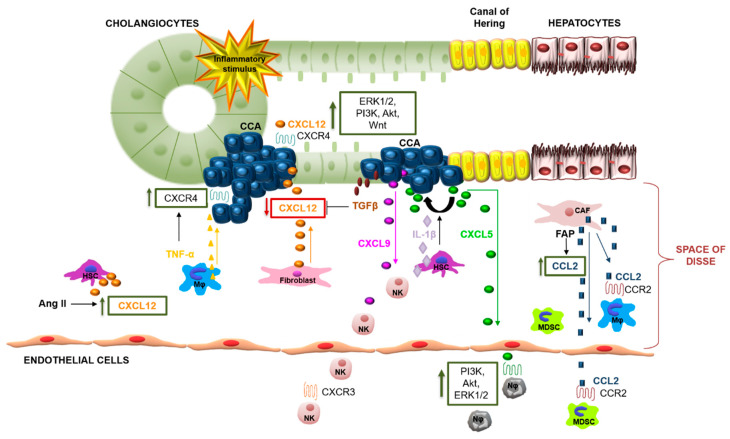Figure 3.
Modulation of CCA development by chemokine networks. Chemokines produced by CCA cells and by intratumor stromal cells, such as CAFs, activate signaling transduction pathways and attract different immune cell types into the CCA TME. CXCL12 released by fibroblast acts on the biological activities of CCA cells. CXCL12 released in CCA microenvironment is negatively modulated by TGF-β and positively by Ang II. TNF-α released by tumor-infiltrating macrophages, promotes the increase of CXCR4 expression in CCA cells. CXCL12/CXCR4 interaction induces activation of PI3K, ERK, Akt and the canonical Wnt signaling in CCA cells. CCL2 secretion, which is induced by FAP in CAFs, mediates migration of MDSCs and macrophages in CCA. CXCL5, secreted by CCA cells and induced by IL-1β released by HSCs, promotes cell migration and invasion through an autocrine loop. In addition, CXCL5 acts as potent chemotactic stimulus for neutrophils inducing neutrophil infiltration through PI3K/Akt and ERK1/2 activation. CXCL9 released by CCA cells correlates with an increase of tumor-infiltrating NK cells. The figure represents a selection among various chemokines involved in CCA progression. Cholangiocarcinoma (CCA), Tumor microenvironment (TME), transforming growth factor-β (TGF-β), angiotensin II (Ang II), tumour necrosis factor-α (TNF-α), phosphoinositide 3-kinase (PI3K), metalloproteinase (MMP), hepatic stellate cell (HSC), cancer-associated fibroblast (CAF), fibroblast activation protein (FAP), myeloid-derived suppressor cell (MDSC), Interleukin-1 β (IL-1β), natural killer cell (NK).

